Inside: Embark on a deep-sea journey as we uncover the beauty of vintage coral reef illustrations from the Australian Great Barrier Reef. All are in the public domain and free to print.
The coral prints are from the book “The Great Barrier Reef of Australia” (1893) by William Saville-Kent. William Saville-Kent was a British marine biologist whose book on the Great Barrier Reef was a pioneering publication worldwide.
The book was, for decades, the definitive work on the world-famous coral reef. There are some excellent vintage maps of Australasia here too.

Facts About The Australian Great Barrier Coral Reef
- The Great Barrier Reef is located in the coral sea off the coast of Queensland, Australia. It is the world’s largest coral reef, comprising over 2,900 individual reefs and 900 islands stretching for over 2,300 kilometres (1,400 miles).
- To give you an idea of the size of the Great Barrier Reef, it is larger than the United Kingdom, Holland and Switzerland combined—or half the size of Texas.
- The reef is so large that it can be seen from outer space. It’s the world’s biggest single structure made by living organisms.
- This reef structure is composed of and built by billions of tiny organisms known as coral polyps. It was declared as a World Heritage Site in 1981.
- The Great Barrier Reef supports an extraordinary diversity of life, including many vulnerable or endangered species, some of which may be endemic to the reef system.
As the coral illustrations of the Barrier Reef below are over 100 years old, I imagine some of these are now extinct or on the endangered list.
The Biological Diversity of the Coral Reef
- Over 400 species, of both hard corals and soft corals, can be found on the reef.
- 30 species of whales, dolphins, and porpoises inhabit the Great Barrier Reef.
- 6 species of sea turtles come to the reef to breed.
- 215 species of birds (including 22 species of seabirds and 32 species of shorebirds) visit the reef or nest or roost on the islands.
- 17 species of sea snake live on the Great Barrier Reef.
- Over 1,500 fish species live on the reef.
- In fact, around 10 percent of the world’s total fish species can be found just within the Great Barrier Reef.
Threats To Great Barrier Reef
Unfortunately, several elements are threatening the survival of the Great Barrier Reef. These include climate change, pollution and shark culling.
As a result of climate change, the oceans are warming, which increases coral bleaching. Coral bleaching leads to increased disease susceptibility, which causes detrimental ecological effects on reef communities.
Another critical threat the Great Barrier Reef faces is pollution and declining water quality. The rivers of northeastern Australia pollute the reef during tropical flood events. Over 90% of this pollution comes from farm runoff.
The government of Queensland has a “shark control” program (shark culling) that deliberately kills sharks throughout Queensland, including in the Great Barrier Reef. Environmentalists and scientists say that this program harms the marine ecosystem of the reef.
The Free Vintage Coral Reef Illustrations and Prints
All the coral reef paintings and drawings are in the Public domain and, therefore, free to use as you wish, whether for crafts and DIYs or to frame for home decor.
You may want to use them for an IKEA floor lamp hack, as I did with the fantastical fish paintings of Louis Renard. Or perhaps frame them in an upcycled gallery wall as I did with the bird naturist prints of George Shaw. Or use them for an under-the-sea collage.
Click on the title above the coral reef print you want to download. A higher-resolution image should then open as a new tab in your browser. You can then print this coral reef illustration or save it straight to your hard drive for further editing.
1.Barrier Reef Anemones
Sea anemones are a group of marine, predatory animals. They are named after the anemone, a terrestrial flowering plant, because of their often colourful appearance.
A typical sea anemone is a single polyp attached to a hard surface by its base, but some species live in soft sediment and a few float near the surface of the water.
Ernst Haeckel also drew colorful illustrations of sea anemones which can be found here.
There is an anemonefish in this coral reef illustration. Anemonefish are also known as clownfish. The most famous one being Nemo from the film “Finding Nemo”

2. Barrier Reef Anemones (2)
A second colorful reef print of Anemones and clownfish plus a shrimp of some kind.
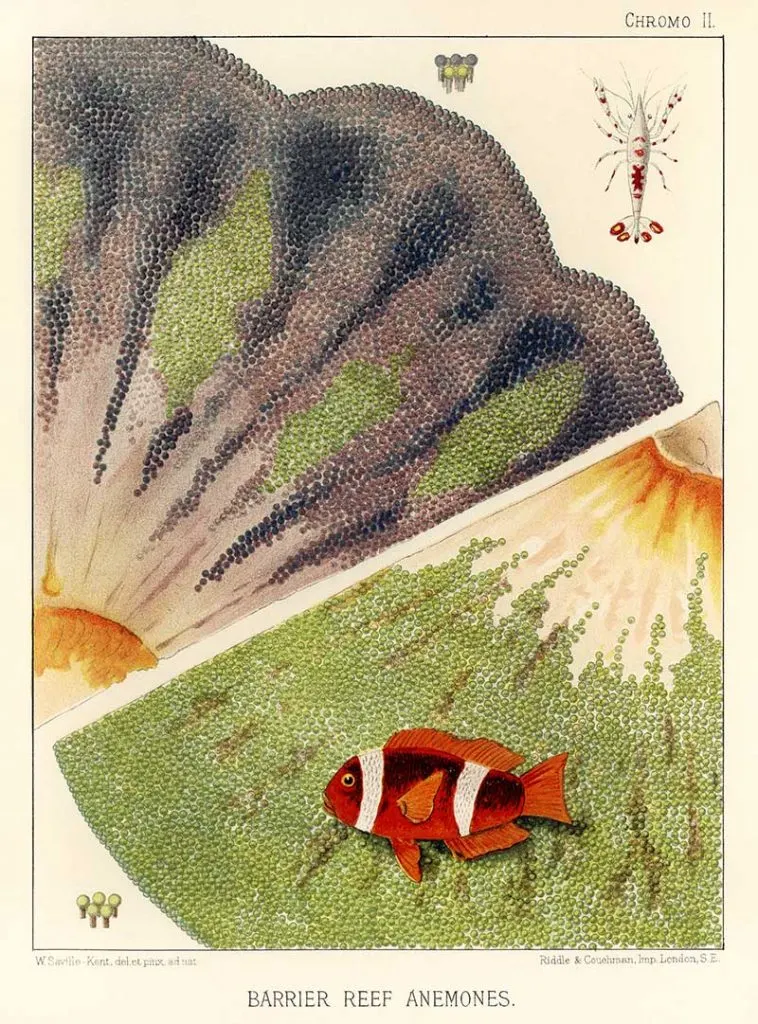
3. Great Barrier Reef Anemones 3
The anemones in this reef print are listed as the following:
- Palythoa caesia
- Rhodactis Howesii
- Haterodactyla Hemprichii
- Acrozoanthus australioe
- Phyllanthus muscorum
- Haterodactyla hypnoides
- Cerianthus noobilis
- Cornularia auricula
- Physobrachia Douglasi
- Zoanthus Coppingeri
- Discosoma Rubra-oris
- Discosoma nummiforme
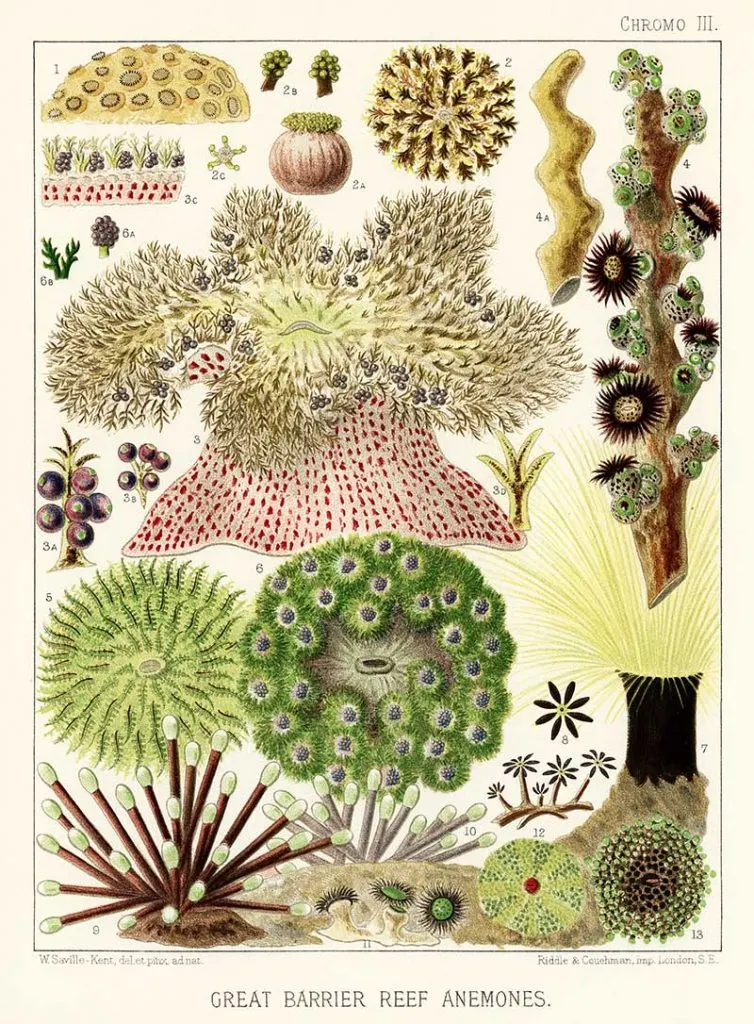
4. Great Barrier Coral Reef Illustrations
There are over 400 species of coral at the Great Barrier Reef, the following 22 are in this print:
- Trachyphyllia amaranius
- Caulastroea Distorta
- Mussa Corymbosa
- Mussa Multilobata
- Prionastroea
- Favia Bowerbanki
- Coeloria
- Prionastroea
- Moseleya Latistellata
- Coeloria
- Goniastroea eximia
- Tridacophyllia Laciniata
- Tridacophyllia Laciniata
- Favia Amicorum
- Prionastroea robusta
- Prionastroea robusta
- Sumphyllia sinuosa
- Coeloria Esperi
- Coeloria Esperi
- CoeloriaFig
- Goniastroea Grayi
- Goniastroea Grayi
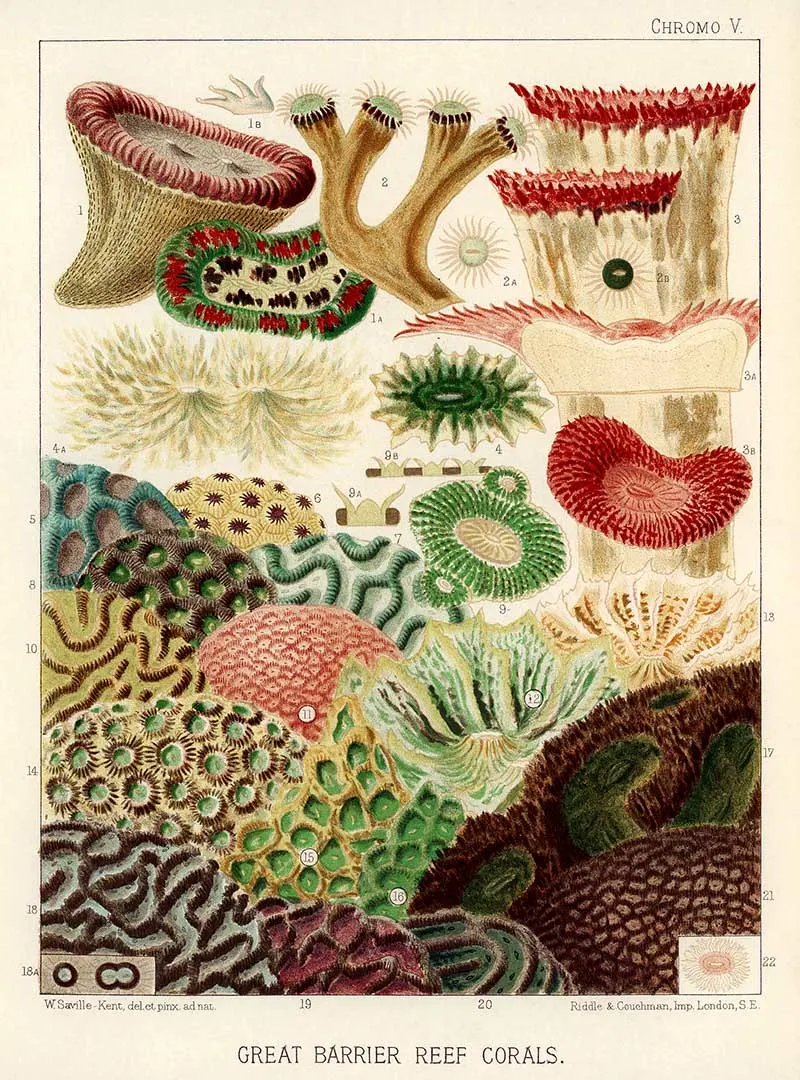
5. Great Barrier Reef Corals 2
This print includes the following coral illustrations:
- Fig 1-5 : Plaesiastroea Peronii
- Fig 2 : plesiasroea versipora
- Fig 3 : Rhoodaroea
- Fig 4-5 : Rhodaroea Fruticosa
- Fig 6 : Rhodaroea Calicularis
- Fig 7 : Cyphastroea
- Fig 8 : Millepora alcicornis
- Fig 9 : Rhodaroea Calicularis
- Fig 10 : Rhodaroea
- Fig 11 : Montipora Scarbicula
- Fig 12 : Heteropsammia Michelini
- Fig 13-14 : Fungia Crassitentaculata
- Fig 15-16 : Cycloseris cyclolites
- Fig 17 : Herprtolitha talpina
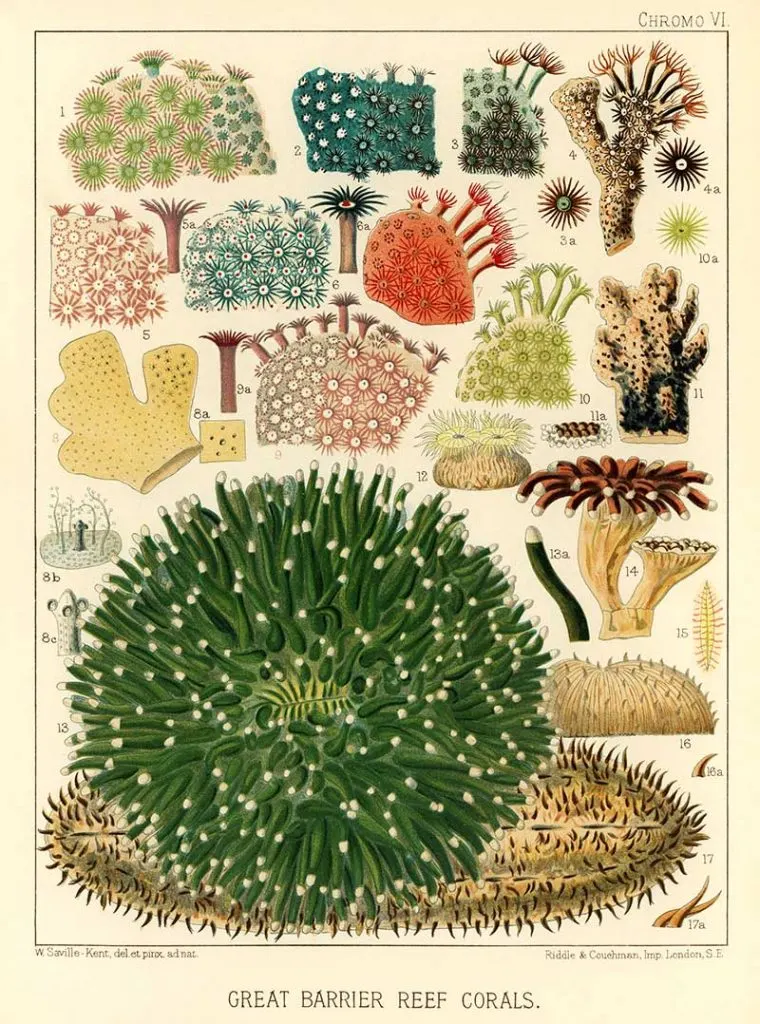
6. Great Barrier Coral Reef Illustration 3
The following corals in this print are:
- Fig 1 : Seriatopora Hystrix
- Fig 2 : Stylopora Palmata
- Fig 3 : Pcillpoora Damicornis
- Fig 4 : Oculina Fasciculata
- Fig 5 : Echinopora horrida
- Fig 6 : Echinopora rosularia
- Fig 7 : Hydnophora rigida
- Fig 8 : Hydnophora
- Fig 9-10 : Merulina ampliata
- Fig 11 : Lophoseris Cristata
- Fig 12 : Gydnophora microcona
- Fig 13 : Hydnophora Demidoffi
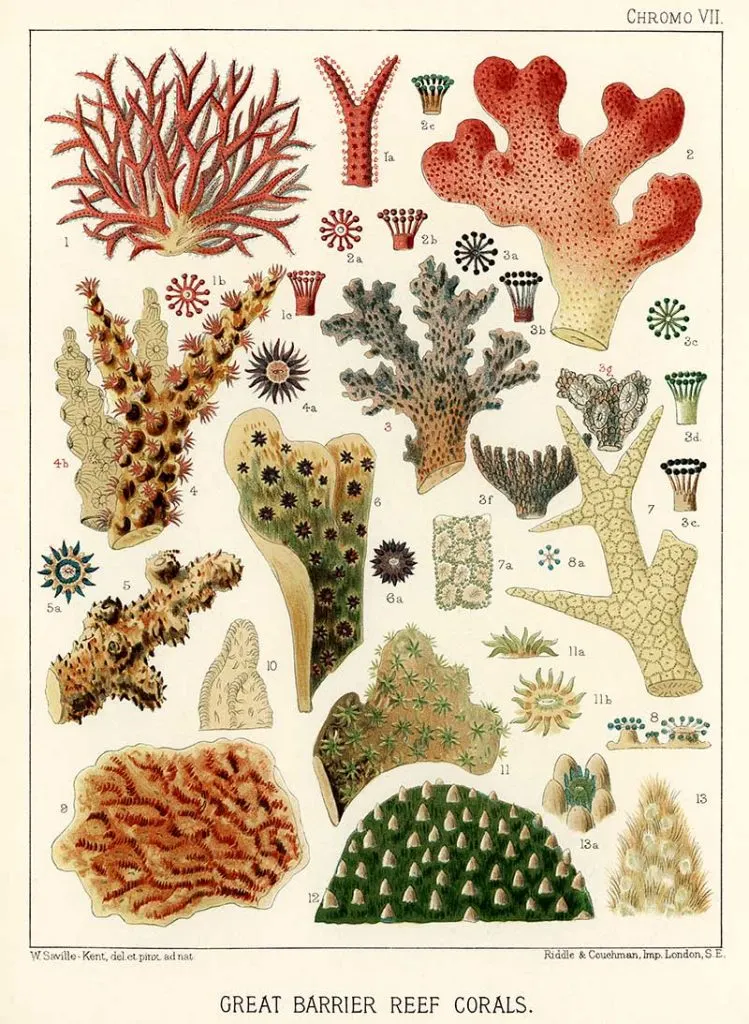
7. Great Barrier Reef Print 4
The following corals are in this print:
- Dendrophyllai coccinea
- Alveopora Clavaria
- Alveopora Viridia
- Dendrophyllia axifuge
- Montipora Foliosa
- Montipora expansa
- Porites astroeoides
- Porites Divaricata
- Porites Furcata
- Montipora verrucosa
- Turbinaria Patula
- Turbinaria Peltata
- Turbinaria Punctifera
- Turbinaria Cinerascens
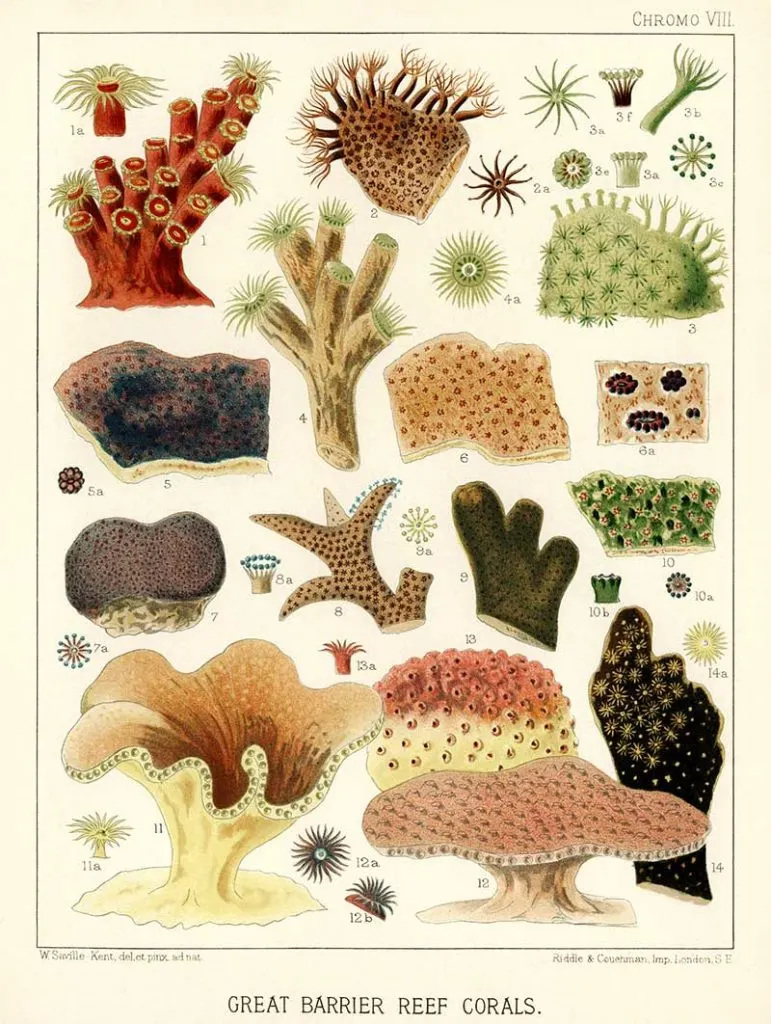
8. Coral Illustrations Print 5
The following corals are illustrated on the print:
- Fig 1-2: Madrepora Prostrata
- Fig 3: Madrepora Kenti
- Fig 4: Madrepora Ornata
- Fig 5: Madrepora Decipiens
- Fig 6: Mdrepora Laxa
- Fig 7: Madrepora secunda
- Fig 8 : Madrepora Grandis
- Fig 9-10: Madrepora Gemmifera
- Fig 11: Madrepora Elseyi
- Fig 12: Madrepora Pulchra
- Fig 13-15: Madrepora Hebes
- Fig 16: Madrepora Scabrosa
- Fig 17: Madrepora Divaricata
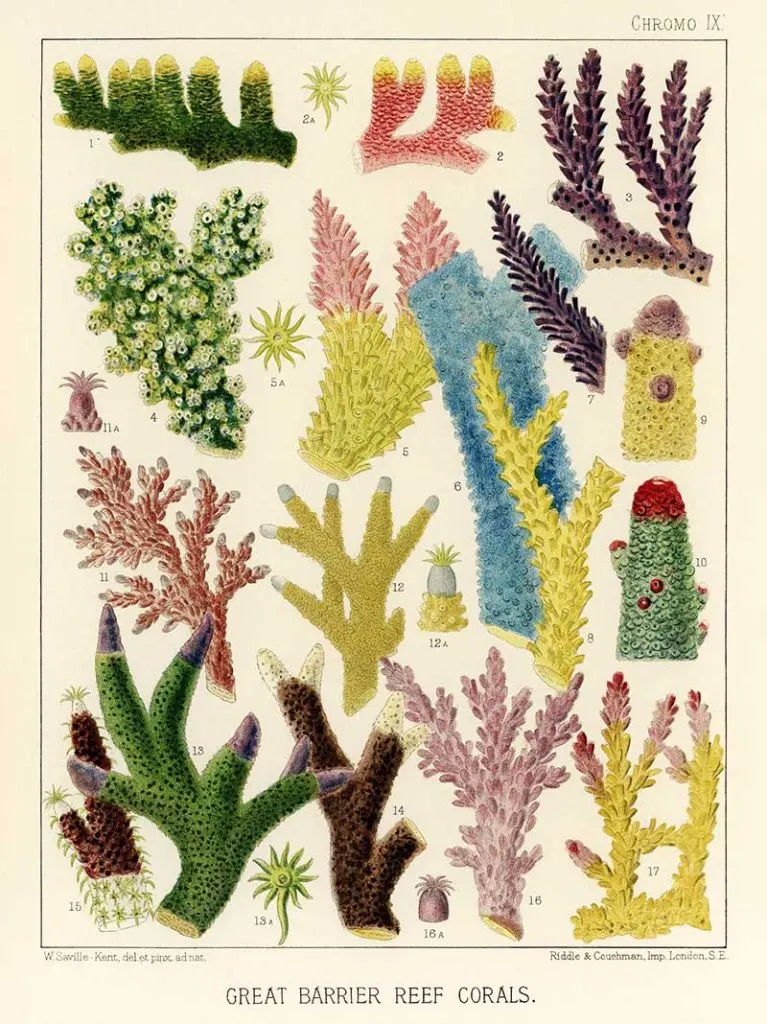
9. Great Barrier Alcyonaria Illustrations
Alcyonaria are more commonly known as Octocorallia and comprise of around 3,000 species of water-based organisms formed of colonial polyps with 8-fold symmetry. It includes the blue coral, soft corals, sea pens, and gorgonians (sea fans and sea whips).
The following corals are illustrated on this print:
- Fig 1-5: Blue coral, Heliopora coerulea
- Fig 6-8: Organ pipe coral, tubipora musica
- Fig 9-10: Cornularia tubiporoides
- Fig 11-12: Spongodes
- Fig 13: Xenia Elongata
- Fig 14: Xenia ochracea
- Fig 15: Xenia Brunnea
- Fig 16: Xenia Pulsitans
- Fig 17: Clavularia viridis
- Fig 18-20: Sarcophyton Glaucum
- Fig 21: Cornularia pavo
- Fig 22: Cornularia Glauca
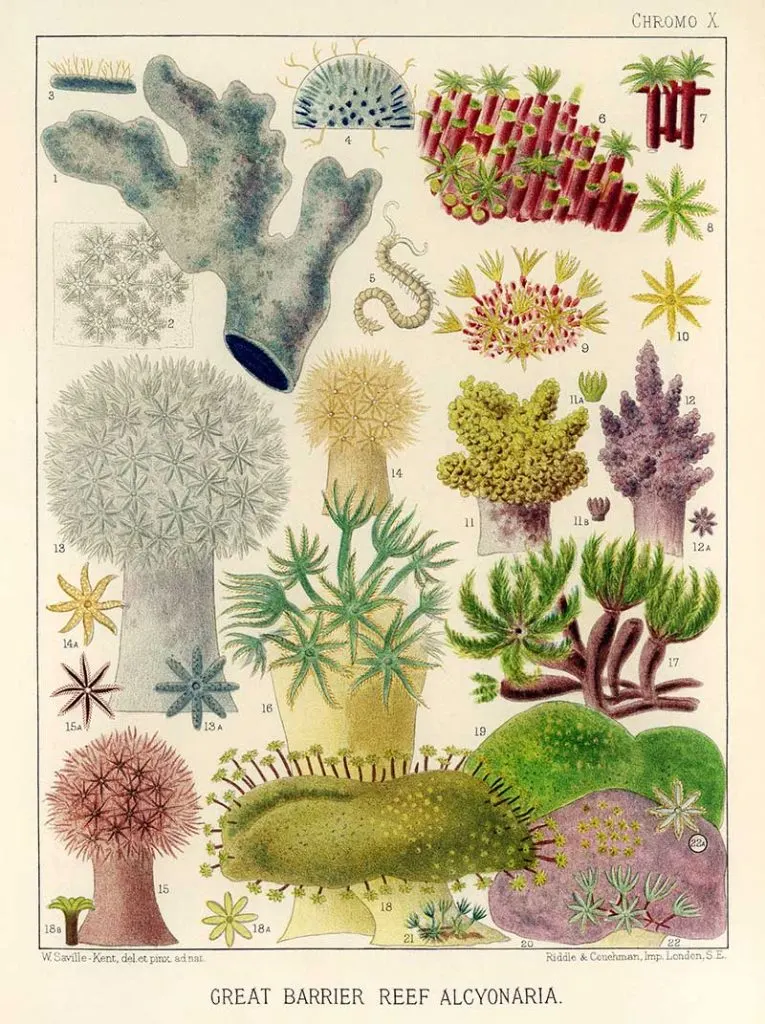
10. Great Barrier Reef Echinoderms
Echinoderms are distinguished by their (usually five-point) radial symmetry, and include starfish, sea urchins, sand dollars, and sea cucumbers, as well as the sea lilies or “stone lilies”.
This Great Barrier poster contains illustrations of the following Echinoderms:
- Fig 1: Isis Hippuris
- Fig 2: Queensland black coral, Antipathes abies
- Fig 3: Ctenocella Pectinata
- Fig 4: Gorgonia Australiensis
- Fig 5: Melitodes Ochracea
- Fig 6: Distichopora coccinea
- Fig 7: Feather Star-fishes, Antedon
- Fig 8: Blue Star fish, Linckia Loevigata
- Fig 9: Nodose Cushion-star, Oreaster nodosus
- Fig 10: Gemmiferous Cushion-Star, Culcita grex
- Fig 11: Long armed brittle star, ophiomastix annulosa
- Fig 12: Needle Urchin, Disdema setosa
- Fig 13: Slate pencil Urchin, Heterocentrotus mammillatus
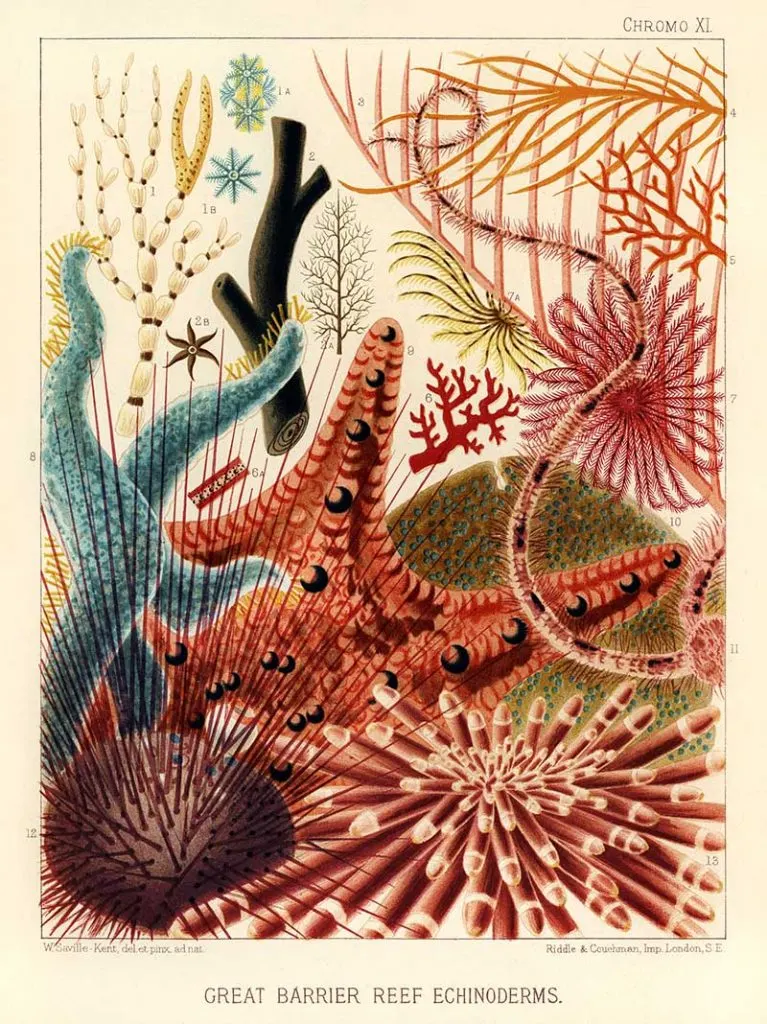
11. Great Barrier Reef Beche-de-Mer
Trepang/Beche-de-Mer is more commonly known as sea cucumbers. Most cultures in East and Southeast Asia regard sea cucumbers as a delicacy.
The sea cucumbers on this Great Barrier reef poster are as follows:
- Fig 1-2: Red fish, Actinopyga obesa
- Fig 3: Green Prickly-fish, Stichopus Chloronotus
- Fig 4: Colochirus Anceps
- Fig 5: Holothurisa Coluber
- Fig 6: Black fish, Antinopyga polymorpha
- Fig 7: Leopard, Spotted fish, Holothuria argus
- Fig 8: Gaint Synapta, beselii
- Fig 9: SynaptaFig
- 10: Glass Eel, Fierasfer
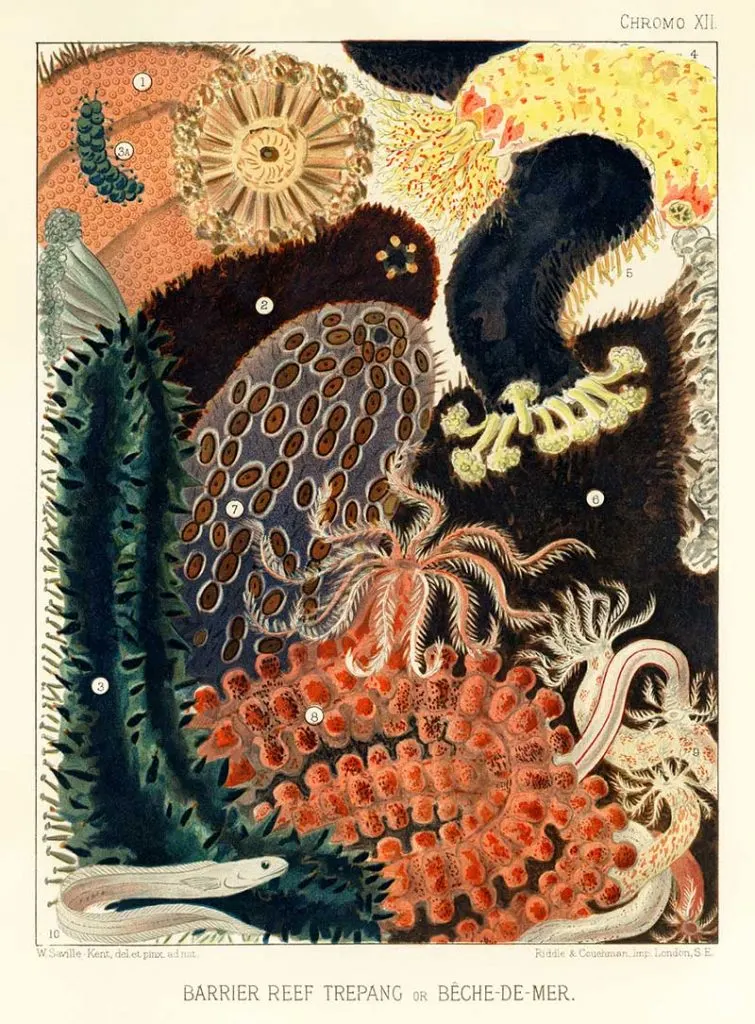
12. Great Barrier Reef Molluscs and Planarian
Planarians are more commonly known as flatworms. This print contains the following species:
- Fig 1: Flatworm, Pseudoceros Kentii
- Fig 2: Planarian, Pseudoceros Dimidiatus
- Fig 3: Blue-spotted Octopus, Octopus Pictus
- Fig 4: Sea-hare, Aplysia
- Fig 5: Protheceroeus flavomaculatus
- Fig 6-7: Nudibranchiate Mollusc, Doris
- Fig 8: Nudibranchiate Mollusc, Gen
- Fig 9: Nudibranchiate Mollusc, Ancula
- Fig 10: Furbelow clams, Tridacna Compressa
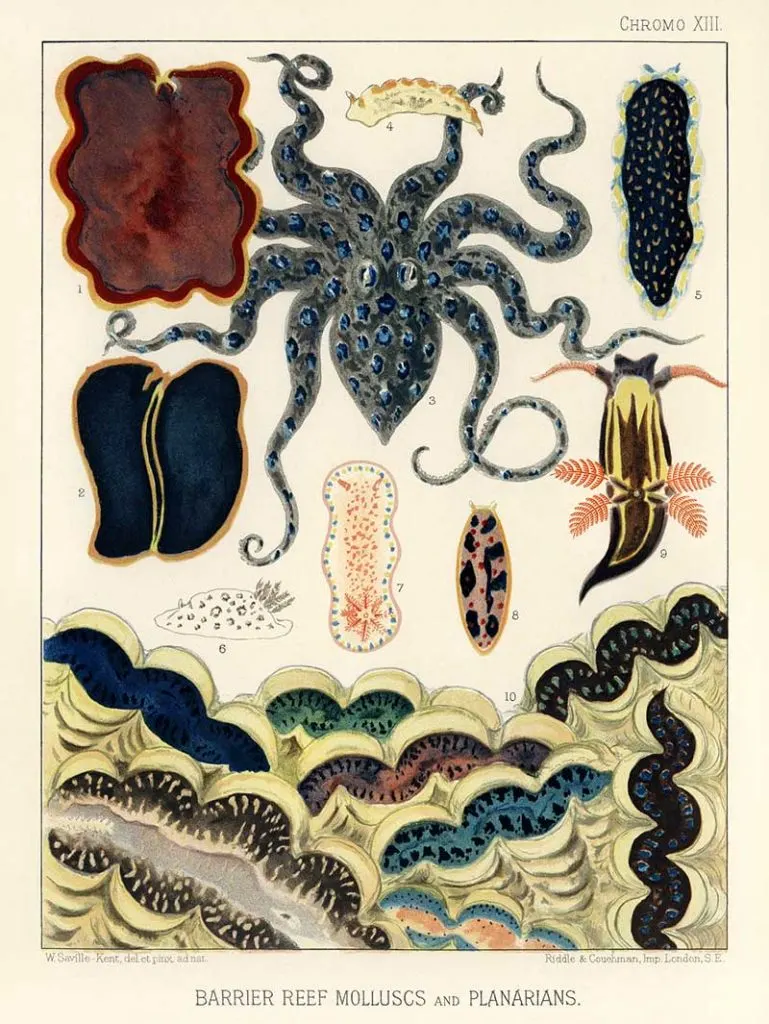
13. Great Barrier Reef Parrot Fishes
A wonderful colorful Great Barrier Coral Reef Illustration of the following parrot fishes:
- Fig 1: Orange banded parrot fish, Xiphochilus Fasciatus
- Fig 2: Hodgkinson’s parrot fish, Choerops Hodgkinsonii
- Fig 3: Scarlet banded Parrot fish, Cheilinus fasciatus
- Fig 4-5: Surf Parrot fish, Pseudoscarus rivulatus
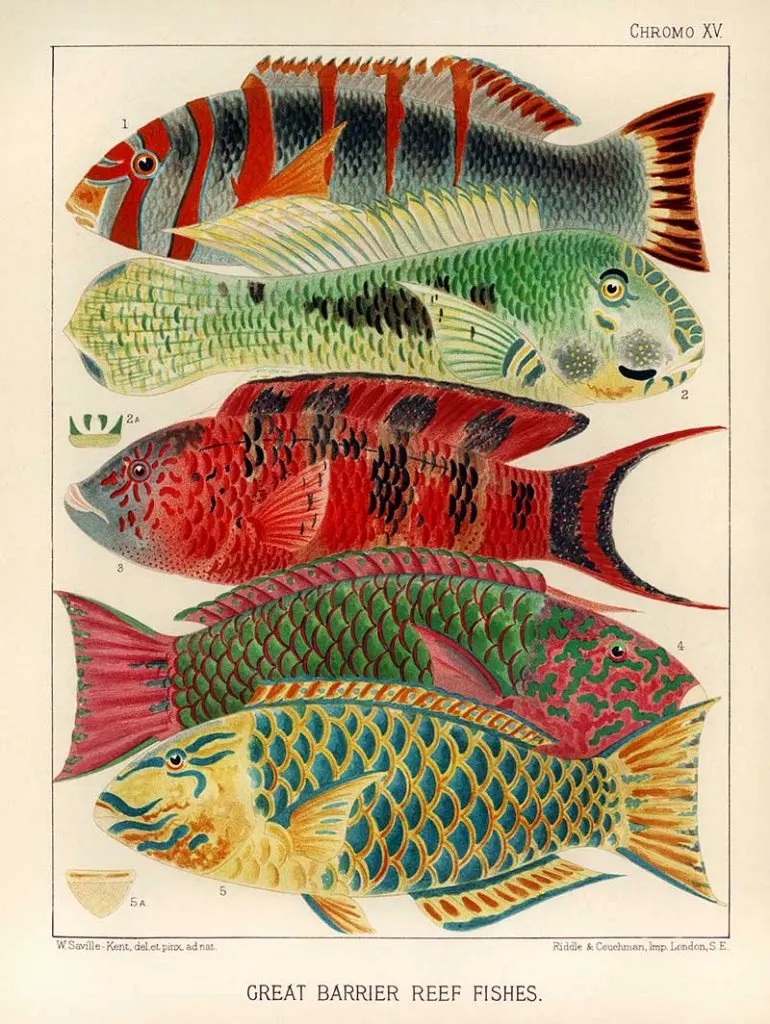
14. Great Barrier Reef Tropical Fishes
The following fishes are on this coral reef illustration:
- Fig 1: Fringe-finned Trevally, Caranx ridiatus, MacLeay
- Fig 2: Dismond Trvally, Caranx Gallus, Lin
- Fig 3: Needle fish, amphisile scuata Fig 4: Blue banded coral fish, Labroides bicincta
- Fig 5: Striped Sole, Solea heterorhina, BLK
- Fig 6: Trigger fish, Centriscus scolopax, Cuv
- Fig 7: Banded Amphiprion, Amphiprion Clarkin (juv), Benn
- Fig 8: Crimson Coral Fish, Polyacanthus Queenslandioe
- Fig 9: Gold finned Coral fish, Labroides Aurpinna
- Fig 10: Horned trunk Fish, Ostracion cornutun, Lin
- Fig 11: Yellow tailed Glyphidodon, Glyphidodon Luteo-caudata
- Fig 12: crimson spotted goby, Gobius Douglasi
- Fig 13: Crimson scribbled Coral fish, Julis lunaris
- Fig 14: Blue breasted coral fish, Julis Cyano-ventor
- Fig 15: Alligator Pipe Fish, Gastrotokeus biaculeata, Bl
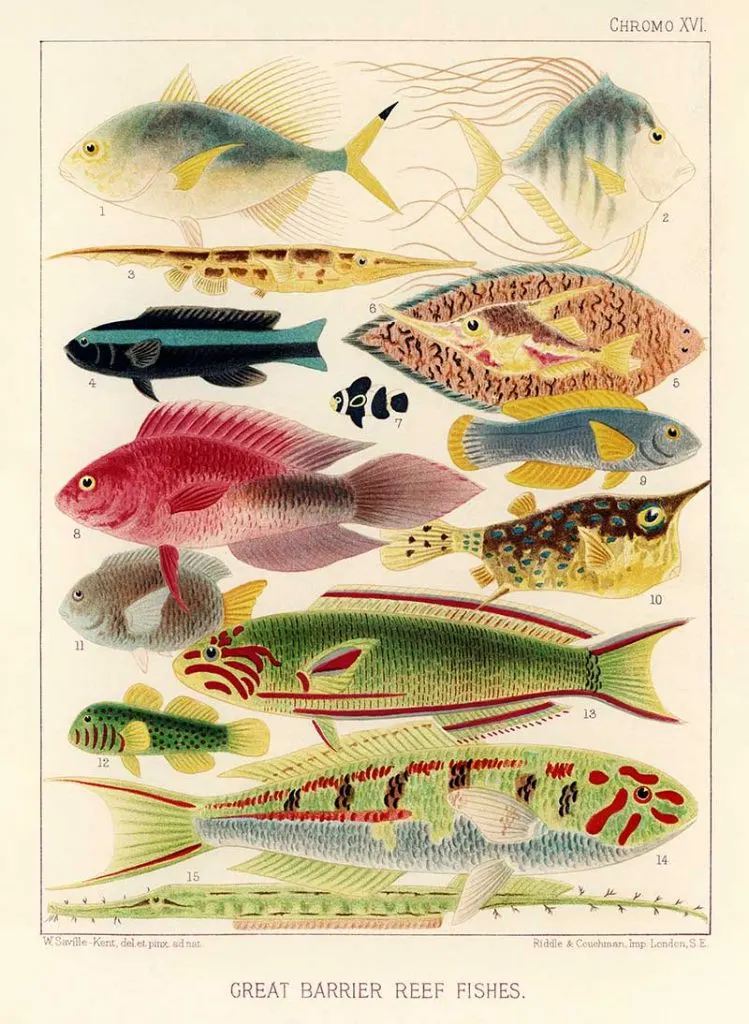
I love the vibrant colours of these vintage coral illustrations; they reflect the vibrancy of the Great Barrier Reef. If you want more wonderful vintage sealife posters, you should check out those of Adolphe Millot.
Other marine-themed collections on Pictureboxblue include these vintage octopus illustrations, conchology prints, vintage seaweed prints, Ernst Haeckel Jellyfish, Japanese Fish woodblocks and shells posters
All these vintage sea life images would look fabulous in a diorama, just like this vintage circus diorama.
There is a fabulous poster of coral in Oliver Goldsmith nature prints collection.
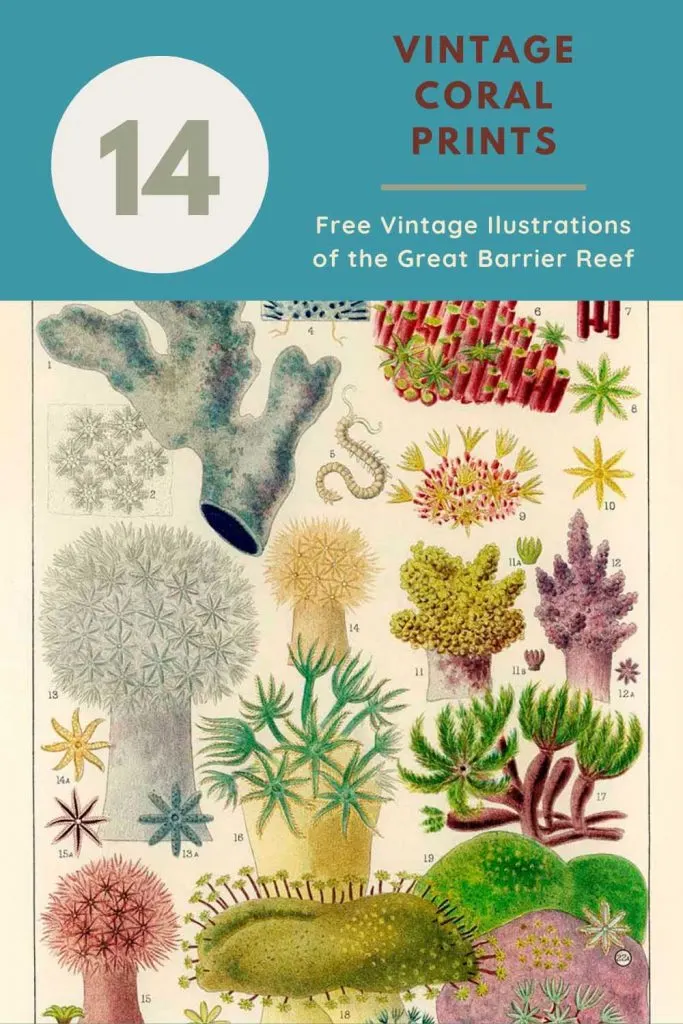
If you fancy, you can Buy Me A Coffee Here.
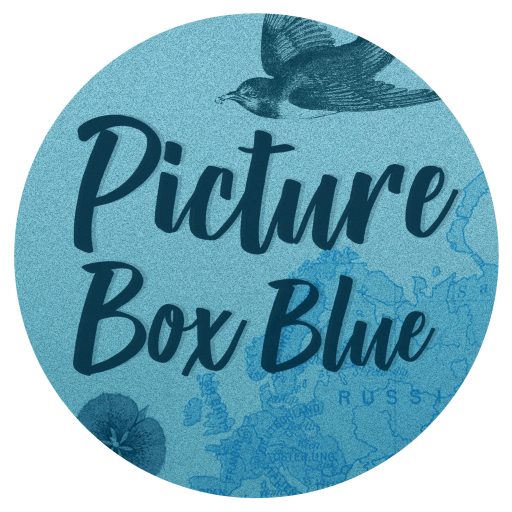
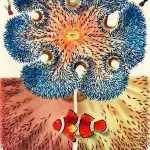
Terri Randall
Saturday 17th of April 2021
Thank you so much! Was able to dive the reef years ago. Great memories and now will add to my mixed media art.
claire
Saturday 17th of April 2021
Thank you, wow that must have been an amazing experience.
Donna @ Modern on Monticello
Wednesday 1st of April 2020
Beautiful and stunning colors! Thanks for posting each week at #HomeMattersParty
claire
Thursday 2nd of April 2020
Yes, they are beautiful I love the colours too.
Jeanne
Sunday 29th of March 2020
I always enjoy your website. :)
claire
Monday 30th of March 2020
Thank you, that is lovely to hear.
Shari Harniss
Thursday 26th of March 2020
WOW! Thank you for such a beautiful post! I really needed this today. Perfect!
claire
Thursday 26th of March 2020
Thank you. The prints are just so vibrant and colourful they make you smile.